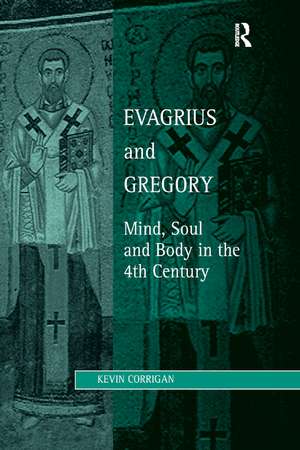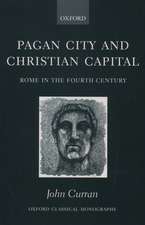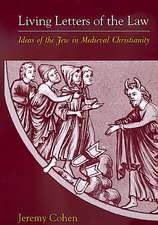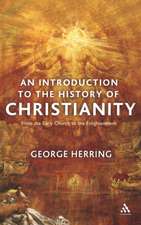Evagrius and Gregory: Mind, Soul and Body in the 4th Century: Studies in Philosophy and Theology in Late Antiquity
Autor Kevin Corriganen Limba Engleză Paperback – 19 dec 2019
| Toate formatele și edițiile | Preț | Express |
|---|---|---|
| Paperback (1) | 385.58 lei 43-57 zile | |
| Taylor & Francis – 19 dec 2019 | 385.58 lei 43-57 zile | |
| Hardback (1) | 1112.21 lei 43-57 zile | |
| Taylor & Francis – 18 mar 2016 | 1112.21 lei 43-57 zile |
Din seria Studies in Philosophy and Theology in Late Antiquity
-
 Preț: 327.29 lei
Preț: 327.29 lei -
 Preț: 469.34 lei
Preț: 469.34 lei - 14%
 Preț: 324.86 lei
Preț: 324.86 lei -
 Preț: 436.14 lei
Preț: 436.14 lei -
 Preț: 436.14 lei
Preț: 436.14 lei -
 Preț: 383.12 lei
Preț: 383.12 lei -
 Preț: 469.34 lei
Preț: 469.34 lei -
 Preț: 390.25 lei
Preț: 390.25 lei -
 Preț: 384.86 lei
Preț: 384.86 lei
Preț: 385.58 lei
Nou
Puncte Express: 578
Preț estimativ în valută:
73.80€ • 80.19$ • 62.04£
73.80€ • 80.19$ • 62.04£
Carte tipărită la comandă
Livrare economică 21 aprilie-05 mai
Preluare comenzi: 021 569.72.76
Specificații
ISBN-13: 9780367882594
ISBN-10: 0367882590
Pagini: 256
Dimensiuni: 156 x 234 x 14 mm
Greutate: 0.36 kg
Ediția:1
Editura: Taylor & Francis
Colecția Routledge
Seria Studies in Philosophy and Theology in Late Antiquity
Locul publicării:Oxford, United Kingdom
ISBN-10: 0367882590
Pagini: 256
Dimensiuni: 156 x 234 x 14 mm
Greutate: 0.36 kg
Ediția:1
Editura: Taylor & Francis
Colecția Routledge
Seria Studies in Philosophy and Theology in Late Antiquity
Locul publicării:Oxford, United Kingdom
Cuprins
Contents: Preface; Evagrius and Gregory: ascetic master, pastoral father; Christian upheavals; Mind, soul, body; an overview of Evagrius' and Gregory's thought; The meaning and scope of impassibility or purity of heart in Evagrius and Gregory; Uncovering the origins and structure of the 7 deadly sins tradition: Evagrius and the 8 'reasonings'; Gregory and the fall of intellect; Body into mind: the scientific eye in Evagrius; Gregory's anthropology: Trinity, humanity and body-soul formation; The human in the divine: the dialogical expansion of mind and heart in Evagrius; Pathways into infinity: Gregory of Nyssa and the mystical life; General conclusion; Bibliography; Index.
Notă biografică
Kevin Corrigan is Samuel Candler Dobbs Professor of Interdisciplinary Humanities and Director of the Graduate Institute of the Liberal Arts at Emory University, Atlanta, Georgia. His most recent book publications are: Plato's Dialectic at Play: Structure, Argument and Myth in the Symposium, (with Elena Glazov-Corrigan) University Park, PA: Pennsylvania State University Press, 2004; Reading Plotinus: a practical introduction to Neoplatonism, West Lafayette, Indiana: Purdue University Press, 2004; Platonisms: Ancient, Modern and Postmodern, edited with John D. Turner, Brill: Leiden, 2007; two volumes: Reading Ancient Texts: The Presocratics and Plato. Essays in Honor of Denis O'Brien; Volume 1: The Presocratics and Plato. Volume 2: Aristotle and Neoplatonism, edited with Suzanne Stern-Gillet, Brill: Leiden, 2007; and with John D. Turner two volumes on Plato's Parmenides and its heritage, SBL Press: Atlanta, 2009: Volume 1: Plato's Parmenides: History and Interpretation from the Old Academy to Later Platonism and Gnosticism; and Volume 2: Plato's Parmenides: Its Reception in Neoplatonic, Jewish and Christian Texts.
Recenzii
’This is the first scholarly attempt to compare the spiritual anthropology of Evagrius of Pontus and Gregory of Nyssa. According to Kevin Corrigan these two towering figures of the late fourth-century church brought to birth a new understanding of Christian thought and practice by their innovative interpretation of the tradition they both received.’ Journal of Theological Studies '... this book is an intriguing, lively, and thoroughly enlightening consideration of the thinking of two philosopher-theologians of the late fourth century. ... In my view, Corrigan's work can lead to a reinvigorated discussion of these two writers, still challenging and undomesticated thanks to their own intelligence and creativity.' Journal of Religion '... a most stimulating and thoughtful book, which sheds considerable light on each of these interesting thinkers and on the links between them.' Aestimatio
Descriere
This book makes accessible, to a wide audience, the thought of Evagrius and Gregory on the soul, in the context of ancient philosophy/theology and the Cappadocians generally. Corrigan argues that in these two figures we witness the birth of new forms of thought and of empirical science in a new key. Evagrius and Gregory are no mere receivers of a















